Introduction
The most fundamental concept of democracy is the idea that government exists to secure the rights of the people and must be based on the consent of the governed. The quote above from the US Declaration of Independence remains an axiom for the ideal form of government by those who support democracy.
The essential meaning of “consent of the governed,” however, can perhaps best be understood by examining countries where it is denied.
What defines “consent of the governed”? Is it the consent of all or of most? Or is it determined by a majority? How is consent obtained? Is it through mass action, representative deliberation or plebiscite? As can be seen in Democracy Web’s Country Studies, there are no set answers and many ways consent of the governed has been instituted.
The essential meaning of “consent of the governed,” however, can perhaps best be understood by examining countries where it is denied. The People’s Republic of China is one example.
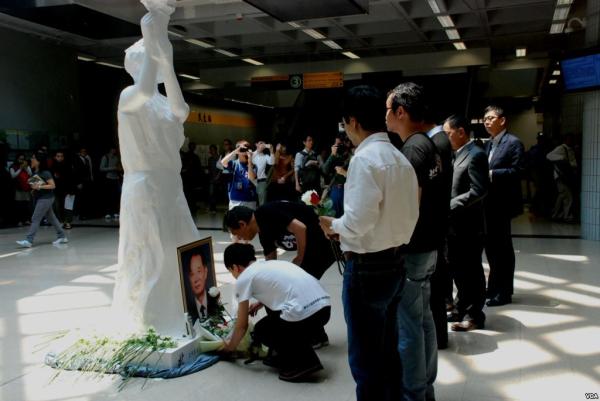
Chinese students erected the Goddess of Democracy as a symbol for their demands in the spring of 1989. Destroyed in the Tiananmen Massacre, a replica was made for the June 4 Museum in Hong Kong, itself closed by Chinese authorities in 2021. Photo by Voice of America.
In the spring of 1989, tens of thousands of university students organized a prolonged series of protests in Beijing's Tiananmen Square to demand truth, accountability and more freedom from their government. They adopted as their symbol a likeness of the Statue of Liberty, calling it the Goddess of Democracy and Liberty. As the protests continued, millions of workers and others joined the students in Beijing and cities across China to demand a voice in their government.
Such a voice had long been denied. Prior to the communist takeover, China’s history was dominated by imperial rule and civil war, with only a brief period of republican government. After the Communist Party seized power in 1949, those who opposed its rule were subject to arrest or worse. The regime's governance was based on the Communist principle of "democratic centralism," which means that the decisions of the party’s leadership—and ultimately the party leader—had to be followed. Under Chairman Mao Zedong’s rule (1949-1973), the Communist Party's ideological campaigns led to an estimated 40 to 80 million deaths through government-induced famine, execution and violent political purges and repression.
The Chinese people had freely consented to none of this. Once power had been achieved by force, the Communist regime ruled through terror and compulsion. No free election was ever held in the People's Republic.
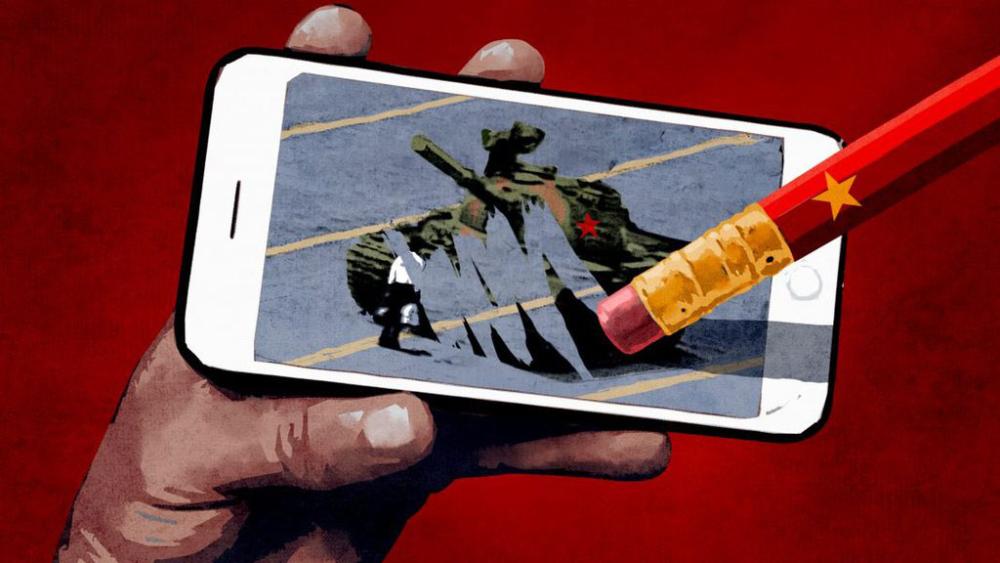
A lone student bravely stood in front of tanks as they entered Tiananmen Square to crush the protests on June 4, 1989. The photo has been censored by Chinese authorities.
When millions of people peacefully protested across China in 1989 to demand democratic change, there was hope government leaders would negotiate with student and worker leaders on their demands for greater openness. But the government decided to again suppress the people’s voice. On June 4, the communist leadership ordered brute force to put down the demonstrations. The world saw a brave individual try to stand in the path of tanks, but in the end the students were helpless to prevent the mass killings and arrests that ensued.
More than 30 years later, the Communist Party remains the supreme authority. Under China’s current leader, Xi Jinping, the regime has adopted increasingly totalitarian methods to control the society and eradicate both ethnic and political diversity. In late 2022, nationwide protests against harsh Covid-19 lockdown policies demonstrated open opposition to the ruling authorities and support for greater freedom. But the regime’s ongoing repression until now has effectively prevented the re-emergence of a sustained, popular movement for democracy as seen in 1989. See also Country Studies of China in Freedom of Expression and Freedom of Association.)
Before Consent of the Governed
Until the original thirteen American colonies asserted the principle of consent of the governed as self-evident, it had been practiced rarely. There are examples of consensual societies among Indigenous nations and some forms of consensual governance in other regions and nations for periods of time. But for most of recorded history, people had lived under different types of dictatorship, usually a form of autocracy, meaning rule by a single leader exercising unrestrained power.
[F]or most of recorded history, people had lived under different types of dictatorship, usually a form of autocracy, meaning rule by a single leader exercising unrestrained power.
Sometimes, the ruler was the best warrior or assembled a superior military force able to seize power over a region, nation or a large contiguous expanse of territory (as Genghis Khan did in the 12th and 13th century in Asia). Such leaders often founded hereditary monarchies, the most common form of autocracy. In most cases, the monarch was all-powerful, claiming his or her position by "divine right" (as commonly in Europe) or by the "mandate of heaven" (as in imperial China). The ruler was sovereign, meaning the supreme authority and representation of the state. The people were not citizens but subjects. They did not consent to be governed but still owed obedience and loyalty to the ruler. Disobedience was punished, often by pain of torture, imprisonment or death.
The people were not citizens but subjects. They did not consent to be governed but still owed obedience and loyalty to the ruler.
In a number of cases, kings or emperors agreed to limit their powers, usually in response to the demands of landowners and nobility who had substantial property and wealth. This established a type of consent by aristocracy, even if the monarch retained supreme authority. Among the most famous agreements limiting the powers of a king is England's Magna Carta Libertatum (Great Charter of Liberties) of 1215. It guaranteed that the king and his successors would not violate certain acknowledged rights and privileges of the nobility, clergy, and also property owners and merchants in towns and boroughs (see also History and Constitutional Limits).
Even when a monarchy limited its powers, that still meant arbitrary and unrepresentative rule for most subjects, often locking them into a life of general servitude. The idea that the people were themselves sovereign was—and in many places remains—revolutionary.
A Positive Definition
Democratic and republican forms of governance existed for a time in Ancient Greece and Ancient Rome. Direct and representative democracy re-emerged in limited form in certain parts of Europe at the time of the Renaissance. In Great Britain, Netherlands, Poland and some other countries, forms of constitutional monarchy emerged allowing limited democratic participation and law-making.
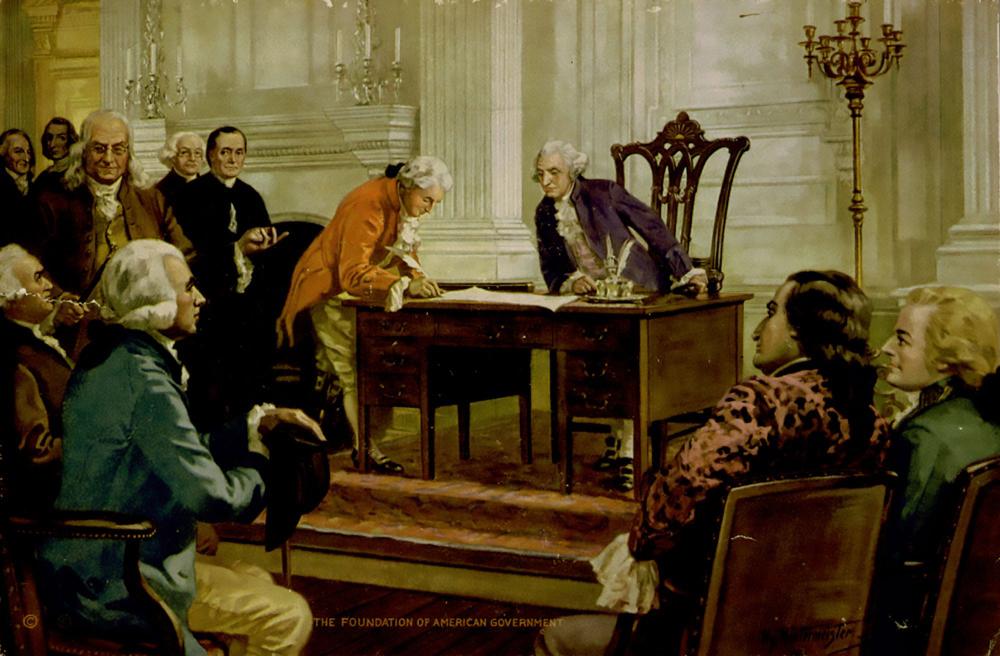
The signing of the United States Constitution by Gouverneur Morris, considered the author of the Preamble to the Constitution. The Convention was presided by George Washington. Other prominent delegates are behind Morris. Painting by Henry Hintermeister.
The United States of America, established in July 1776, was the first modern republic formed around the idea of consent of the governed.
The United States of America, established in July 1776, was the first modern republic formed around the idea of consent of the governed. The term means that the people of a country or territory have the right of self-rule and must consent, either in a direct referendum or through elected representatives, to the establishment of their own government. In practice, America’s original consent was based on a limited franchise, or right to vote, and the total exclusion of those held in bondage. Yet, the process of approving the US Constitution did expand the realm of consent to a greater number of male (and even some female) citizens. Out of the process of ratification of the Constitution, the basic principle of consent of the governed emerged as an ideal for a new form of government that broke with absolute monarchy.
In most modern cases where consent of the governed is practiced, the form of the state is a republic, or rule by citizens qualified to vote within an agreed-upon legal framework. Yet, constitutional monarchies, where the monarch remains the formal state sovereign, also function with consent of the governed, as in the United Kingdom. Over time, the British monarch gave up nearly all political authority and state functions to the popularly elected House of Commons.
Achieving Consent of the Governed
An original consent of the governed—either the formation of a new state or adoption of a new constitution—is sometimes achieved through direct democracy or a plebiscite.
An original consent of the governed—either the formation of a new state or adoption of a new constitution—is sometimes achieved through direct democracy or a plebiscite. This may follow a revolutionary revolt, civil war or other popular challenge to the authority of a non-consensual government.
Original consent may also be achieved through elected representative institutions, such as an existing legislature (which occurred with the Glorious Revolution in Great Britain in 1688) or a special constitutional assembly (which occurred with the initial Declaration of Independence of the United States of America in 1776). In some cases, the establishment of a new constitutional system requires a "supermajority" of three-fifths to three-quarters of those eligible to decide matters in order to convey greater popular assent. But in other cases, a simple majority suffices or the methods are mixed.
Original consent may also be achieved through elected representative institutions, such as an existing legislature...or a special constitutional assembly
For example, the US Constitution, which replaced the new country’s original Articles of Confederation in 1788, needed the people’s consent. Ratification required the approval of state legislatures or ratifying conventions in at least nine of the thirteen newly constituted states. In many of the states, approval of the Constitution was by a slim margin. Further consent to amendments to the Constitution also had to be passed by three-quarters of the states, but states often decided by simple majority vote of their legislatures or in ratifying state conventions. (There have been 27 amendments to the US Constitution.)
What remains fixed is the principle that the people, in whole or in large part, not a king or an invested aristocracy, are sovereign. The people must provide consent to how they are governed either directly or through elected representatives.
Many countries have used simple popular majorities in national referenda or in national legislatures to approve new constitutions, amend constitutions, or establish national and supranational structures. What remains fixed is the principle that the people, in whole or in large part, not a supreme leader or an invested aristocracy, are sovereign. The people must provide consent to how they are governed either directly or through elected representatives.
In most countries where self-governance took root, as in the United States, those who initially acted for the people as a whole were limited by property ownership or tax status as well as by sex, race and forms of servitude. Fulfilling the ideal of self-governance to include all citizens would require prolonged struggles to end slavery and to expand the right to vote (see History section in Free and Fair Elections). Over time, popular sovereignty was understood to require universal suffrage, with the right to vote in a representative or direct democracy established for all citizens of a certain age, now usually 18 years and older (see also History).
Forms of Consent
Once self-government is established, consent of the governed is maintained through free, fair and regular elections and referenda. Elections are held at or within fixed intervals set by law or the constitution.
Each election allows the people to choose their leaders and the policies of the state according to majority rule. Each election, therefore, is a form of consent to be governed and offers the possibility to change leaders and policies by choosing a new majority. Any majority may pass laws to alter policies within the bounds of the constitution. If the laws are insufficient to achieve the demands of the public, the people or their representatives may modify or replace the constitution.
By its nature . . . consent of the governed is not a fixed but an ever-changing and evolving form of political governance that encompasses the whole of the people through both representative and direct (or plebiscitary) democracy.
By its nature, then, consent of the governed is not a fixed but an ever-changing and evolving form of political governance that encompasses the whole of the people through both representative and direct (or plebiscitary) democracy.
The most common form of representative democracy is the parliamentary system, in which the executive branch is determined and controlled by the political party or coalition of parties that wins a majority of seats in a parliament and forms the government. The other major form is a presidential or mixed-presidential system, as in the U.S. and France, in which there are separate elections for head of state and for the legislative branch and a separation of powers between executive and legislative branches.
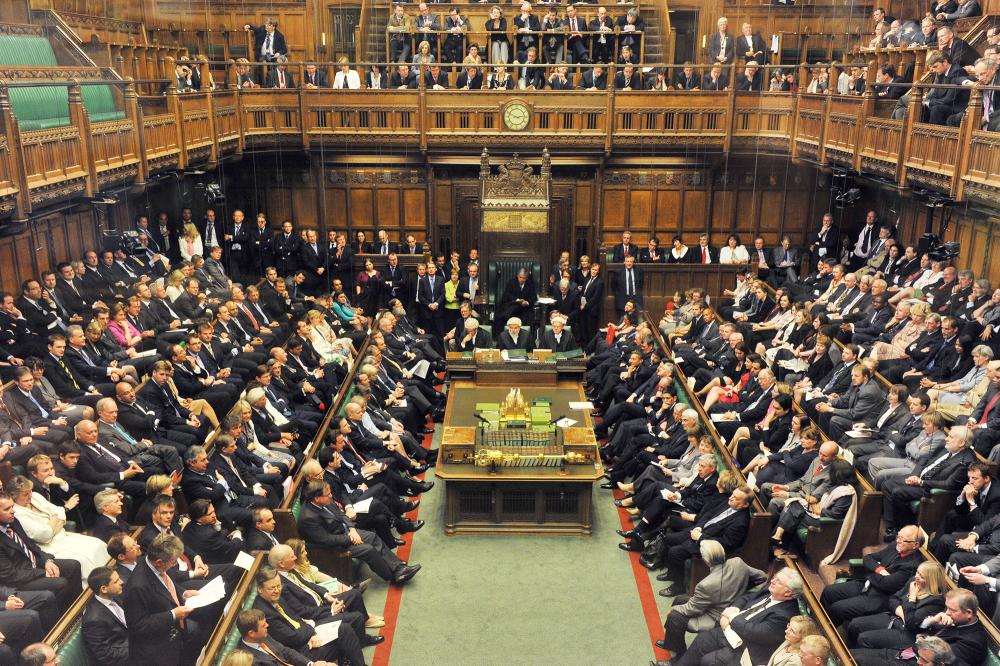
The parliamentary system is the second main form of consent of the governed. In the United Kingdom, governing party members face opposition members in the House of Commons in the Westminster Parliament building. A recent meeting of the House of Commons (2010). Open Government License. Source: UK government.
Within these forms of representative democracy, political parties compete to institute different policies (see also section on the Multiparty System). From such competition, two broad political forms of democracy emerged. These are: liberal democracy in its original sense of the term as a governing system promoting liberal, that is free market or laissez faire, economics; and social democracy as a governing system aiming to achieve greater economic and social equality by limiting the free market through regulation, progressive taxation and public services (see also section on Economic Freedom). Today, there are a range of pro-free market and pro-redistributionist policies within democracies. However, as a result of the economic breakdown of the Great Depression, most democracies, even when governed by pro-free market parties, maintain some form of social democracy (or welfare state).
Today, the term liberal democracy is understood more broadly: a democracy having the essential principles listed in Democracy Web (constitutional limits, rule of law, human rights, and so on). The original laissez faire meaning of the term, part of libertarian philosophy, is today referred to as neo-liberalism.
Essential Conditions
In How Democracies Die, political scientists Steven Levitsky and Daniel Ziblatt describe certain necessary conditions for a democracy to function with consent of the governed. When those conditions are not respected, democracies weaken and may fail, allowing for the rise of authoritarianism.
Self-governance is an agreement of the citizenry to conduct politics by peaceful means rather than by the use of force to decide power and impose a form of rule. A system of governance imposed by force or maintained by violence lacks consent of the governed.
Firstly, to compete for power in elections, all participants, whether individual candidates or political parties, must agree to reject violence as a means of politics and reject support from organized groups using violence.
The reason is plain. Democracy is the practice of politics by non-violence. Although consent of the governed is sometimes the consequence of violent revolution to overthrow tyranny, it is established only through elections, representative assemblies or plebiscites. Self-governance is an agreement of the citizenry to conduct politics by peaceful means rather than by the use of force to decide power and impose a form of rule. A system of governance imposed by force or maintained by violence lacks consent of the governed.
If the minority determined the outcome of elections or decided on policies, there would no longer be consent. There would be minority rule.
Secondly, there must be agreement of the citizenry not just on the conduct of politics but also on its resolution. Among the most important principles of democracy is majority rule. General consent is rarely achieved. All democratic systems, therefore, require the minority to accept that the majority establishes a government and decides its policies. If the minority determined the outcome of elections or decided on policies, there would no longer be consent. There would be minority rule.
Given that the minority accepts the will of the majority, the majority, once established, should represent all of the citizenry. A third essential condition, therefore, is that the majority respect the essential principles of minority rights, including basic individual rights like freedom of expression and freedom of association. In this way, the minority may fully participate in politics and compete in future elections for the support of the majority. (See also Majority Rule, Minority Rights.)
Observing the rules established for the peaceful transfer of power is thus the most important condition for consent of the governed. If there were not such observance, only force would decide.
Fourthly, all parties and candidates accept that all citizens eligible to vote may participate in elections. Parties or candidates cannot select out a portion of the electorate that supports them to vote. All eligible citizens must have the right and opportunity to vote. If citizens are denied that right and opportunity, there is not a full democracy (see also Free, Fair and Regular Elections).
Finally, once the voters have made their choice in an election, all parties and candidates must agree to abide by the outcome and work within the country’s constitutional limits and system of rule of law. Regardless of how the voters choose, whether to keep the same majority in power or not, a formal change of power from one government to another takes place. Observing the rules established for the peaceful transfer of power is thus the most important condition for consent of the governed. If there were not such observance, only force would decide.
A Constant Test
Meeting all of these conditions is a constant test of any democracy. Both newer and more established democracies have faced recent challenges. One example is Brazil. There, the former president, Jair Bolsonaro, spread disinformation contesting the election results following his defeat in the 2022 election, leading supporters to attempt a takeover of the government on January 8, 2023. In response, all political parties, even that of the former president united in opposition to the violence and affirmed the election of the new president, Luiz Inácio (Lula) da Silva. Bolsonaro has been barred from running for office until 2030 by its highest electoral court and the Supreme Court has taken its own steps, ordering social media companies to bar disinformation and presiding over the prosecution of leaders and participants in the attempted coup. (See Resources for The New York Times article on Brazil by Jack Nikas. Recent examples with tests to self governance in Democracy Web’s Country Studies include Bolivia, Guatemala, France, Israel, Kenya, Philippines and Poland.)
Among the most significant challenges faced by any democracy is in the United States, considered the world’s oldest modern democracy. There, many essential conditions described above were not met during recent elections.
Among the most significant challenges faced by any democracy is in the United States, considered the world’s oldest modern democracy. There, many essential conditions were not met during recent elections and self-governance itself was tested.
In 2020-21, an incumbent president, the Republican Donald J. Trump, refused to accept a loss to his opponent in the national election and sought to overturn the result in an attempt to maintain power. It was the first such occurrence in America’s prior 232-year history. In doing so, Trump violated many of the above conditions. He claimed that the rules of the election were illegitimate; he rejected the results and their certification without basis; and he sought to overturn the election results by various extra-constitutional and illegal schemes in what constituted an attempt at an autogolpe (or self-coup).
When those efforts failed, Trump directed a violent assault on the US Capitol by his supporters on January 6, 2021 to block the proceeding of Congress for accepting the certified results of the Electoral College ─ the essential proceeding allowing the peaceful transfer of power to take place. (See, for example, links in Resources to the Report of the Select Committee to Investigate the Attack on the US Capitol and the Department of Justice’s indictment United States vs. Trump for “criminal efforts to overturn [the 2020 presidential election] and retain power.”)
The attempted insurrection was repulsed by police and military forces after many hours. The Congress met in the night to fulfill its obligation to accept the certified Electoral College results. The winner, Democrat Joseph R. Biden, was inaugurated as president on the proscribed date of January 21, 2021.
Since then, however, Trump and many in the Republican Party have transgressed essential conditions for consent of the governed by continuing to contest the legitimacy of the 2020 election and of US elections generally, by not renouncing violence as a means of politics, and by not fully distancing themselves from groups advocating violence. At this writing, Donald Trump remains the standard bearer for the Republican Party for the 2024 presidential election despite being indicted for illegally attempting to overthrow the system of government. It remains to be determined if the courts or voters will hold the former president responsible for attempting to block the peaceful transfer of power. (For further discussion on this test of democracy, see History in Accountability and Transparency.)
The weakness of a system of consent that allows a form of minority rule has affected the democratic legitimacy of the government as a whole.
One basis for this ongoing contestation of power lies in the indirect means that the United States chooses its president, by an Electoral College resulting from elections in all states and the District of Columbia instead of by national popular vote. In 2016, Trump won the presidency despite losing the national vote by nearly 3 million ballots. The national popular vote in 2020 was won by an even large margin (7 million), yet the Electoral College vote of 306-232 in favor of Biden was determined by just 33,000 out of 16.5 million total votes cast in three decisive state elections.
The weakness of a system of consent that allows a form of minority rule has affected the democratic legitimacy of the government as a whole. (For further exploration of government legitimacy in the U.S., see links in Resources for Danielle Allen’s “democracy renovation” series, and the Report of the American Academy of Arts and Sciences called “Our Common Purpose.”)
A Negative Definition
As noted above in the case of China, consent of the governed can often better be understood by where it is lacking. While democracies offer many positive ─ even if flawed ─ examples of self-governance, authoritarian regimes offer clear examples of the negative consequences of rule without the people’s consent.
It is typical for all forms of dictatorship to deny freedoms to citizens, violate the rule of law, exercise power arbitrarily, and act harshly to keep those who rule in power.
As seen in Democracy Web’s Country Studies of “not free” countries, authoritarian regimes take various forms. They include: autocracy (or arbitrary rule by a single leader, as in Azerbaijan, Kazakhstan, Syria and Uzbekistan); theocracy (as in the Islamic Republic of Iran); monarchy (as in Saudi Arabia and Morocco); military rule (as in Bolivia prior to 1982 and Guatemala prior to 1985); and apartheid or rule by a racial minority or majority (as in South Africa until the early ‘90s); among others. It is typical for all forms of dictatorship to deny freedoms to citizens, violate the rule of law, exercise power arbitrarily, and act harshly to keep those who rule in power. (This section compares and contrasts South Africa, Bolivia and Iran and their transitions both from and toward authoritarian rule.)
A distinct category of dictatorship is totalitarianism, which is based on a comprehensive ideology (such as fascism or communism) and a disciplined political party apparatus that controls the state. These regimes are defined by total state control over the economy and society, typically achieved through state dominance, purges of public institutions, general repression, and mass murder. Historical examples include Nazi Germany, the Soviet Union, and the People’s Republic of China under Mao Zedong. Current examples are Cuba and North Korea. Vladimir Putin’s rule in post-Soviet Russia and Xi Jinping’s leadership in the People’s Republic of China are restoring many aspects of their countries’ past totalitarian rule.
A distinct category of dictatorship is totalitarianism, which is based on a comprehensive ideology (such as fascism or communism) and a disciplined political party apparatus that controls the state.
Modern authoritarian rulers have often seized power by citing the need to safeguard the integrity of the state against supposed external threats or to maintain political stability against social unrest. Communist dictatorships have further justified their rule by claiming to secure economic and social rights of the population. What both types of regimes generally achieve is oppression and poverty. Often, such arbitrary rule has led to famine, war and even genocide. Some modern authoritarian governments, however, such as Malaysia, Singapore and China have had long periods of economic growth and general improvement of living standards.
Although most authoritarian and totalitarian rulers achieve power through violent revolution or a military coup d'état, they claim to have the consent of the governed. But they rarely allow free and fair elections or referendums to test their claims. What are called “elections” are in fact highly controlled spectacles designed to coerce the population into a non-democratic process for legitimating authoritarian rule. When a relatively free election or referendum has been allowed by a dictatorship, the people have usually taken the opportunity to vote against it (as in Chile in 1988 and Poland in 1989).
There are some cases, such as Nazi Germany, in which a modern dictatorship is described as coming to power through elections. In fact, the Nazi Party, while participating in elections and winning a plurality in 1932, could not form a majority coalition. Its extremist leader, Adolf Hitler, was appointed as Chancellor by the president only when the parliament deadlocked on forming a government. Once in office, he seized total power through intimidation, thuggery and police action in what amounted to a coup d'état (see Country Study of Germany).
A more recent, less extreme, example is Hungary (see Freedom House report). There, the Fidesz Party gained a supermajority in parliament by a plurality of the vote in 2010. It then altered the constitution and laws to control the political process, to create unfair conditions for elections, and to institute authoritarian and corrupt practices. This has ensured their hold on power until today.
The Right to Rebellion
Implied in the principle of consent of the governed is the right to withdraw that consent, that is to overthrow a regime that abuses the people through tyrannical, arbitrary, incompetent or unrepresentative rule. This was the right that the British philosopher John Locke asserted was intrinsic to a system of natural law, one that the thirteen American colonies appealed to when rebelling against King George III in 1776 (see also History in this section).
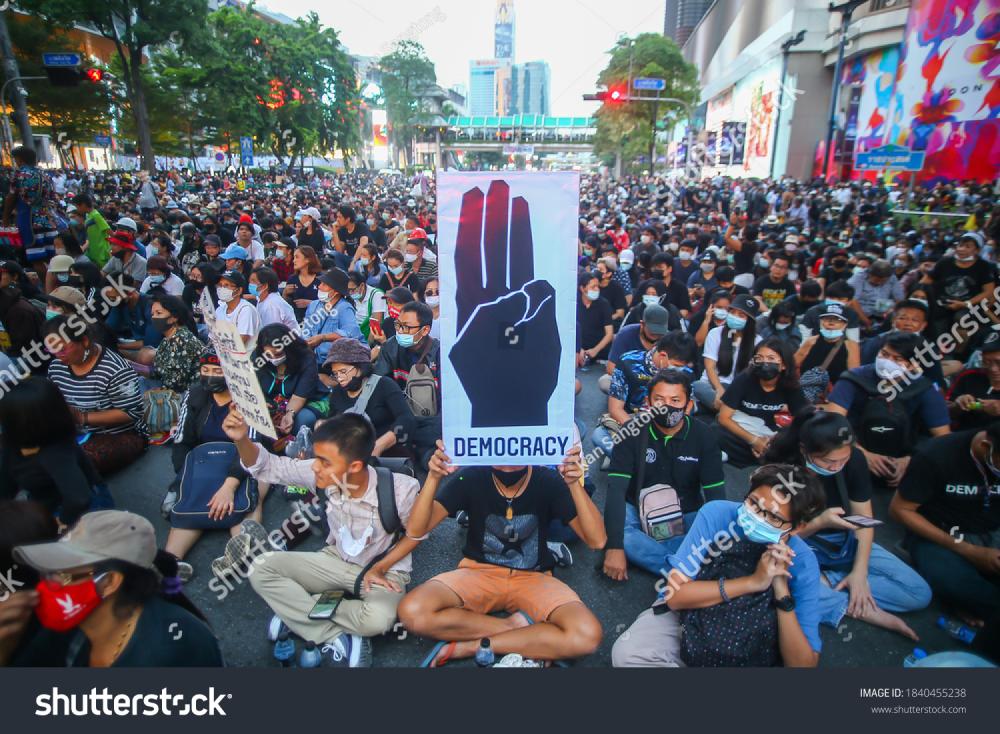
Thousands of young protestors assemble in Bangkok in 2020 to advocate for democratic and economic reforms. The Move Forward Party, representing younger voters, won a plurality in elections in 2023. Shutterstock. Photo by Kan Sangtong.
The cause of rebellion—in other words, the withdrawal of consent—must rest on legitimate grounds, such as the general violation of the citizenry’s natural rights or common liberties.
But Locke's principle is not a general right of rebellion or revolution. The cause of rebellion—in other words, the withdrawal of consent—must rest on legitimate grounds, such as the general violation of the citizenry’s natural rights or common liberties. Simply, the right of rebellion rests on the people’s resistance to tyranny.
Thus, in 1861, President Abraham Lincoln asserted an opposite principle: A minority of states could not be allowed to secede to preserve a form of tyranny ― slavery ― and thus destroy a constitutional republic based on self-governance and liberty. Such a republic had to be preserved against an anti-constitutional and anti-democratic rebellion.
Notwithstanding the revolutionary origins of the United States, violent rebellion against tyranny today is not generally seen as a model or even a legitimate means for changing repressive governments. In most modern cases of the overthrow of dictatorship, peaceful mass protest and well-organized civic resistance has been the more successful means by which to overcome tyranny and establish self-governance (see Resources). As seen during the French Revolution and in many instances during the 20th century, violent revolution or armed rebellion may result in new forms of dictatorship.
National Minorities and Consent of the Governed
What happens when a subjugated minority group asserts the right to withdraw its consent to be governed by a national majority?
In most modern cases of the overthrow of dictatorship, peaceful mass protest and well-organized civic resistance has been the more successful means by which to overcome tyranny and establish self-governance.
This has occurred in a number of places where ethnic or religious minorities desire independence from dominant or oppressive national or religious majorities. In some cases, the international community has recognized the right of self-determination for oppressed peoples within existing states to form their own independent countries, as in Kosova and East Timor.
For some minorities seeking independence or autonomy, however, the world has been less supportive of the assertion of the right of self-determination and failed to prevent its suppression. This has been the case even when governments resorted to mass killings or genocide, as the Russian Federation did in Chechnya and Sudan did in Darfur (see Country Study). Despite several international treaties and documents protecting both nationality and minority rights, the world’s nations have not shown consistency in protecting them.
The content on this page was last updated on .